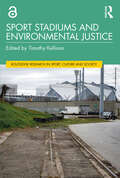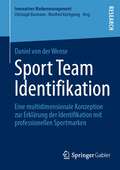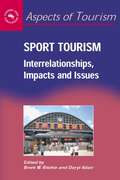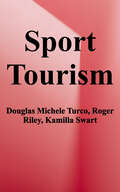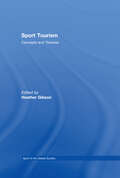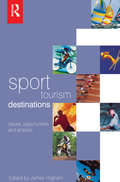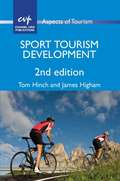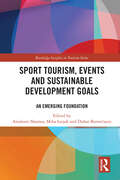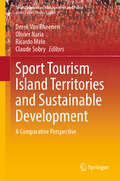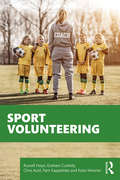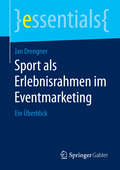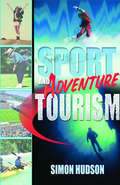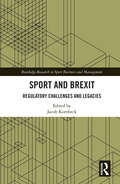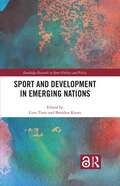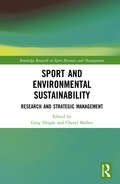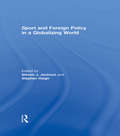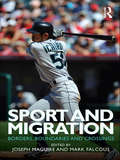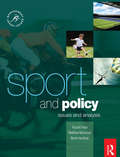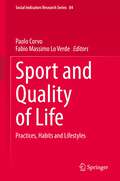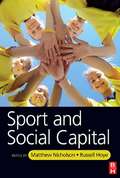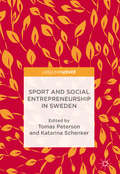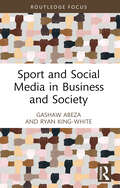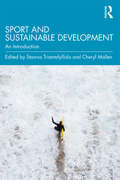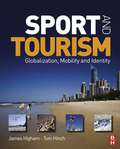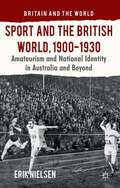- Table View
- List View
Sport Stadiums and Environmental Justice (Routledge Research in Sport, Culture and Society)
by Timothy KellisonThis book explores the local environmental impact of sports stadiums, and how that impact can disproportionately affect communities of color. Offering a series of review articles and global case studies, it illustrates what happens when sport organizations and other public and private stakeholders fail to factor environmental justice into their planning and operations processes. It opens with an historical account of environmental justice research and of research into sport and the natural environment. It then offers a series of case studies from around the world, including the United States, Canada, Kenya, South Africa, and Taiwan. These case studies are organized around key elements of environmental justice such as water and air pollution, displacement and gentrification, soil contamination, and transportation accessibility. They illustrate how major sports stadiums have contributed positively or negatively (or both) to the environmental health of the compact neighborhoods that surround them, to citizens’ quality of life, and in particular to communities that have historically been subjected to unjust and inequitable environmental policy. Placing the issue of environmental justice front and center leads to a more complete understanding of the relationship between stadiums, the natural environment, and urban communities. Presenting new research with important implications for practice, this book is vital reading for anybody working in sport management, venue management, mega-event planning, environmental studies, sociology, geography, and urban and regional planning.
Sport Team Identifikation: Eine multidimensionale Konzeption zur Erklärung der Identifikation mit professionellen Sportmarken (Innovatives Markenmanagement)
by Daniel von der WenseDas psychologische Konstrukt der Identifikation hat in der Marketingwissenschaft und in der Unternehmenspraxis in letzter Zeit vermehrt Aufmerksamkeit auf sich gezogen. Insbesondere für professionelle Sportvereine ist eine starke Identifikation der Fans die wichtigste Voraussetzung, um ihre Existenz langfristig zu sichern. So führt die rasante Zunahme von physischen und digitalen Freizeit- und Unterhaltungsangeboten bei gleichbleibendem Zeitbudget der Konsumenten zu einem verschärften Wettbewerbsdruck bei professionellen Sportvereinen. Als Folge dieser Entwicklung sinken u.a. die Zuschauerzahlen in den Stadien. Professionelle Vereine stehen daher vor der großen Herausforderung, aktuelle und potenzielle Fans stärker an sich zu binden. Ein zentrales Mittel, wie dieses gelingen kann, ist der Aufbau und die Intensivierung von Identifikation. Diese hat nachgewiesenermaßen eine besonders starke Verhaltenswirkung und führt zu einer langfristigen emotionalen Bindung gegenüber dem Verein. Vor diesem Hintergrund hat sich Daniel von der Wense der Aufgabe gewidmet, das Konstrukt der Identifikation im Zusammenspiel verschiedener Bezugsobjekte konzeptionell tiefer zu durchdringen und eine fundierte empirische Studie zu deren Wirkungen auf den Stadionbesuch von Fans vorzulegen.
Sport Tourism
by Brent W. Ritchie Daryl AdairThis book examines the economic, social and environmental impacts and issues associated with the development of sport tourism globally, including the lack of research and coordination between industry and government. The book suggests the need for a more balanced analysis of the impacts and issues associated with future sport tourism development.
Sport Tourism
by Kamilla Swart Douglas Michele Turco Roger RileySport Tourism introduces students to the phenomenon of sports tourism--one of the fastest growing niche markets in the $500 billion tourism industry. <p><p>Students will learn to define sport tourism and to apply fundamental marketing principles to competitive and recreational activities in which sport is the primary or secondary attraction. <p><p>Sport Tourism covers participatory sport tourism (e.g. ski, golf and tennis resorts; whitewater and wilderness trips; sports theme cruises; adventure tours and sport camps) and event-based sport tourism (e.g. the Olympic Games, college football, the Baseball Hall of Fame, or the World Cup). <p><p>Sport Tourism guides students through the process of designing, implementing, and evaluating sport tourism operations by offering extensive industry examples and thought-provoking questions. The book investigates such key topics as feasibility studies, niche marketing, pricing, sponsorships, advertising, media involvement, recruitment of personnel and volunteers, and evaluating customer satisfaction during and after participation. Throughout, the authors stress the need for careful research and market planning and offer clear strategies and potential challenges to the sport tourism novice.
Sport Tourism (Sport in the Global Society)
by Heather GibsonThe study of sport tourism is on the cusp of moving from a descriptive phase of research into an analytical phase. Consequently, many academics and graduate students are searching for theories upon which to ground their work. This book draws upon theories and concepts from sociology and anthropology (the socio-cultural perspective), sport and tourism studies, and business studies. One of the dangers of a new area of study is that the body of knowledge is built on a range of seemingly unrelated studies. By grounding work in a theoretical perspective, future work can be linked to, and contribute to building a cohesive understanding of various aspects of sport tourism. This book is an edited collection written by some of the top scholars working in a particular domain throughout the world, providing a compendium of theories and concepts that can be used to frame research on various aspects of sport tourism.This volume was previously published as a special issue of the journal Sport in Society.
Sport Tourism Destinations
by James HighamFew forces in contemporary society influence the fortunes of tourism destinations more immediately than sport. From football fans to kayaking, Sports Tourism Destinations: issues, opportunities and analysis examines the planning, development and management of sport tourism destinations. With contributions from international experts, this book looks at the dramatic effects sports tourism has on the economy and future of tourism destinations. Divided into four parts, the book systematically covers: Sports tourism destination analysis: applies principles of destination resource analysis to the study of sport tourism destinations Destination planning and development: illustrates the mutually beneficial links between sport, tourism and destination planning. Destination marketing and management: explores theoretical and applied aspects of sport tourism destination marketing and management Sport tourism impacts and environments: identifies and discusses critical issues of sustainable development at sport tourism destinations Practical case studies in each chapter illustrate and highlight the links between sport tourism theory and practice, making this book a vital resource for lecturers and students alike.
Sport Tourism Development
by James Higham Tom HinchThe second edition provides an incisive, comprehensive examination of sport tourism, exploring the scope and diversity of the linkages between sport and tourism, and focusing on their manifestations in time and space. In presenting a critical discussion of theoretical and applied issues in sport tourism, the authors synthesize a wide range of literature into insightful perspectives of key dimensions of sport tourism development, using 'focus points' in each chapter to illustrate real-world manifestations of the concepts and issues being discussed, with additional support provided by international case studies. Continued growth in the demand for sport tourism experiences has heightened the need for advanced, in-depth and critical insights that are theoretically informed. This incisive book has been written to address that need and to stimulate the curiosity of students, educators and practitioners alike.
Sport Tourism, Events and Sustainable Development Goals: An Emerging Foundation (Routledge Insights in Tourism Series)
by Anukrati Sharma Miha Lesjak Dušan BorovčaninDiscover the transformative potential of sports tourism and events in achieving Sustainable Development Goals (SDGs) with "Sport Tourism, Events and Sustainable Development Goals: An Emerging Foundation." This groundbreaking collection explores the profound impact of these sectors in shaping a more sustainable future.Readers of this book will gain a deep understanding of how sports tourism and events can serve as powerful catalysts for achieving SDGs. Through a rich array of case studies, innovative strategies, and expert insights, the book provides a roadmap for harnessing the full potential of these sectors to promote social, economic, and environmental sustainability. Readers will benefit from a multidisciplinary approach that integrates theory and practice, offering actionable solutions for scholars, practitioners, and policymakers alike.This book is intended for scholars, students, professionals, and policymakers interested in the intersection of sports tourism, events, and sustainable development. It serves as an invaluable resource for anyone seeking to leverage the dynamic synergy between these fields to drive positive change and achieve SDGs on a global scale.
Sport Tourism, Island Territories and Sustainable Development: A Comparative Perspective (Sports Economics, Management and Policy #24)
by Ricardo Melo Claude Sobry Derek Van Rheenen Olivier NariaThis edited volume discusses the role of sport tourism in local sustainable development in small island territories. Using an international, comparative study, this volume explores the contributions of sport tourism to sustainable development in island settings. Written by 25 research teams across ten seas, oceans, and island archipelagos, chapters present comparative findings with the view of assisting stakeholders and decision-makers in collaboratively and responsibly developing island territories in accordance with specific sustainable development goals. Presenting a refined comparative methodology at the intersection of sport tourism and sustainable development, this book is geared towards academic researchers and students interested in sport tourism, sports economics, management and sustainable development, as well as professionals.
Sport Volunteering
by Russell Hoye Graham Cuskelly Chris Auld Pam Kappelides Katie MisenerVolunteers are central to sport at all levels, from mega-events to grassroots clubs. Sport Volunteering is a definitive guide to the issues associated with managing volunteers in sport. The book focuses on the psychology of the voluntary experience, the challenges inherent in managing a volunteer workforce for not-for-profit and other groups, and the development of volunteers. It provides a perspective on the roles of volunteers in the development and delivery of sport in a range of contexts – events, clubs, associations and other non-profit groups – and explores important contemporary issues such as sustainability, diversity and the management of risk. This book is essential reading for anybody studying sport volunteering or managing volunteers in sport, and a valuable resource for students of sport development, sport management, sport business, sport events, sport administration, sport policy, community sport, sport facilities, sport operations, event management or sport coaching.
Sport als Erlebnisrahmen im Eventmarketing: Ein Überblick (essentials)
by Jan DrengnerJan Drengner erörtert, wie Unternehmen durch die Einbeziehung des Sports das Erlebnispotenzial ihrer Marketing-Events erhöhen können, um so ihre Kommunikationsziele effizienter zu erreichen. Aufgrund seiner hohen gesellschaftlichen Akzeptanz bietet der Sport vielfältige Ansatzpunkte zur Ausgestaltung des Eventmarketing. Aufbauend auf einem Überblick über verhaltenswissenschaftliche Hintergründe zu den Wirkungen solcher sportorientierter Events gibt dieses Essential umfangreiche Hinweise zu deren Inszenierung. Abschließend stehen mögliche Risiken im Mittelpunkt, die in der Praxis beim Einsatz des Sports im Eventmarketing zu berücksichtigen sind.
Sport and Adventure Tourism
by Simon HudsonDiscover the secrets to success in sport-related tourism and adventure travel!This essential handbook of sport-related travel provides an in-depth look at an international industry growing by leaps and bounds. Sport and Adventure Tourism serves as a unique reference resource for sports and tourism professionals, educators and students, presenting an invaluable overview of a niche market that&’s rapidly outgrowing its niche. Covering every aspect of sport tourism from historical, economic, and sport-specific starting points, the book features thoughtful and incisive commentary from the foremost experts in the field.Presented in a concise, easy-to-read format, Sport and Adventure Tourism provides an unrivaled orientation to all facets of sport-related tourism and leisure management. Sports travel (both participatory and spectatorial) and adventure tourism are examined in terms of size and growth of the market, marketing and management strategies, and future prospects. The book includes international, up-to-date case studies, links to relevant Websites and an extensive roster of references.Sport and Adventure Tourism examines all aspects of sport-related tourism, including: planning, developing, and marketing an event skiing and snowboarding boating, sailing, and fishing the “phenomenon” of golf tourism mountain-based adventure tourism the growing spa industry virtual sports tourism-an alternative to travelThis one-of-a-kind primer presents an informative study of sports, leisure, and adventure travel, covering everything from golf tourism to heli-skiing to sports event and spa tourism. A handbook for professionals, a textbook for academics, and a highly readable introduction for anyone interested in sport-related travel, Sport and Adventure Tourism is an essential guide for anyone who takes a not-so-leisurely approach to leisure time.
Sport and Brexit: Regulatory Challenges and Legacies (Routledge Research in Sport Business and Management)
by Jacob KornbeckThis is the first book to investigate the significance of Brexit for sport, with a particular focus on the regulatory and legal challenges that it poses, and the economic and political stresses that are likely to follow in its wake. Written by a team of leading researchers working across sport studies, legal studies and political science, and edited by an EU official with nearly two decades of experience working in EU sport policy, the book explains why regulation, and European dis-integration, matter to sport. It examines key topics including free movement, State aid and labour law, and considers the interests of key stakeholders from fans to football clubs to governing bodies. This is an essential reference for any advanced student, researcher, policy maker, administrator or industry professional working in sport, international law, political science, or international business and management.
Sport and Development in Emerging Nations (Routledge Research in Sport Politics and Policy)
by Brendon Knott Cem TinazFor the first time, this book examines the strategies of leaders of emerging nations to use sport as a tool for reaching social, economic, cultural, political, technological or environmental goals and gaining international prestige. It assesses whether sport can really be an effective tool in international development. The book explores the unique challenges, issues and opportunities offered by sport for development in emerging nations. Bringing together case studies of sport and development in countries including Brazil, China, Czech Republic, Hungary, India, Indonesia, Mexico, Poland, Qatar, South Africa, South Korea and Turkey, the book looks at policies designed to achieve development through, by and for sport, and whether they have achieved their socio-economic objectives. It considers the way that emerging nations have used major international sports events as political and developmental projects, as well as the importance of sporting infrastructure, professional leagues, participation programmes and the influence of nationalism and ideology.With a truly global perspective, this book is important reading for any student, researcher or policy-maker with interest in sport management, sport development, development studies, international economics, globalisation or political science.
Sport and Environmental Sustainability: Research and Strategic Management (Routledge Research in Sport Business and Management)
by Cheryl Mallen Greg DingleDrawing on recent work in sport studies, business and management, health, science, and law, this book offers a critical examination of the latest published research on sport and environmental sustainability. It examines how strategic management, policy and education influence the relationship between sport and the natural environment, and how the transmission and advancement of knowledge via research journals can, and should, have an impact on policy and practice. Covering sport at all levels, from professional to non-profit, and across all sectors of sport management, from marketing and events to facilities and communications, Sport and Environmental Sustainability makes a powerful argument for an awareness of, and need for, environmental sustainability in sport. Chapters outline the research and methods used, expose gaps in the literature and encourage opportunities for future inter-disciplinary research. Topics include sport and climate change, sport and safeguarding air and water quality, education for sustainability, and sport policy. This is an invaluable resource for researchers in sport and environmental sustainability, and academics working in sport management, business, recreation and leisure studies, and sustainability programs, as well as sport policymakers and industry practitioners.
Sport and Foreign Policy in a Globalizing World (Sport in the Global Society)
by Steven J. Jackson and Stephen HaighGlobalization is effecting a close convergence of sport and foreign policy. In order to respond to novel social, political, cultural and economic pressures, states are increasingly turning to sport as a foreign policy instrument; and they cannot ignore the corresponding influence that global sport has on their core interests. This book is devoted to exploring this relationship in detail. Although any examination of sport and foreign policy inevitably focuses on issues related to both politics and international relations, the primary intention here is to consider the dimensions associated with foreign policy. This book was previously published as a special issue of Sport in Society.
Sport and Migration: Borders, Boundaries and Crossings
by Joseph MaguireFrom Major League Baseball to English soccer’s Premier League, all successful contemporary professional sports leagues include a wide diversity of nationalities and ethnicities within their playing and coaching rosters. The international migration of sporting talent and labor, encouraged and facilitated by the social and economic undercurrents of globalization, mean that world sport is now an important case study for any student or researcher with an interest in international labor flows, economic migration, global demography or the interdependent world economy. In this dazzling collection of papers, leading international sport studies scholars chart the patterns, policies and personal experiences of labour migration within and around sport, and in doing so cast important new light both on the forces shaping modern sport and on the role that sport plays in shaping the world economy and global society. Presenting original case studies of sports from European and African soccer to Japanese baseball to rugby union in New Zealand, the book makes an important contribution to our understanding of a wide range of issues within contemporary social science, such as national identity politics, economic structure and organization, north-south relations, imperial legacies and gender relations. This book is invaluable reading for students and researchers working in sport studies, human geography, economics or international business.
Sport and Policy (Sport Management Series)
by Barrie Houlihan Matthew Nicholson Russell HoyeSport and Policy is the first book of its kind to critically analyse the regulatory role of the state and its impact on sport and the intersections of sport with other areas of government policy. Offering a unique and comprehensive examination of how sport is affected by a range of government policy, each chapter uses an international comparative approach in order to facilitate a broad understanding of sport and policy in a global context. This book is essential reading for any student or practitioner studying or working in policy today, and is: The first book to examine the intersection of sport with other (non-sport) policies from an international perspective including topics such as gambling, the media, social inclusion and economic development Far-reaching in scope encompassing government regulation and sport’s intersections with other government policies This challenging text provides an accessible critical analysis of the intersections of sport with government policy.
Sport and Quality of Life: Practices, Habits and Lifestyles (Social Indicators Research Series #84)
by Paolo Corvo Fabio Massimo Lo VerdeThis book brings together essays analyzing the impact of sport and physical activity on psychophysical well-being and quality of life, through multidisciplinary and multi-country studies. It discusses how the commercial dimension of sport entertainment and recreational dimension of sport practice have been increasingly brought together in discussions on individual health and well-being, and social integration and participation. It therefore considers the relationship between sports practice, enjoyment of sporting events, sport participation and quality of life. The chapters examine various aspects of the practice of sport for professional and recreational purposes from the perspective of age, life course research, physical education in schools, government investment in sport activities across various stages of life, the rise of sports tourism as a global industry and how social networks and web apps are changing the perception of fitness. This innovative book is of interest to scholars and students of sport science, leisure studies, and well-being research.
Sport and Social Capital
by ElsevierDespite the importance of sport as a social, economic and political institution, research into sport and social capital has not been extensive. Sport and Social Capital is the first book to examine this increasingly high profile area in detail. It explores the ways in which sport contributes to the creation, development, maintenance and, in some cases, diminution of social capital. Written by an internationally renowned author team who are leading figures in this area of study, this engaging and far-reaching text brings leading research from around the world into one comprehensively edited volume. Themes covered in the book include: education, gender, policy, community, youth sport, diversity and many more. It is essential reading for sport management, sport development and sport sociology students around the globe and offers fascinating and invaluable insight to interested stakeholders from industry, community and government.
Sport and Social Entrepreneurship in Sweden
by Tomas Peterson Katarina SchenkerThis edited collection explores the concept of social entrepreneurship in sport, examining how it has been used in Swedish society to date. It explores how this approach in sport could also be used to address wider socio-political issues, including economic, political, cultural and pedagogical in European society. Sport and Social Entrepreneurship in Sweden explores different social entrepreneurship projects which have created new forms of activity and reached groups of children and young people previously disengaged in sport. The authors also highlight the growing momentum of this kind of entrepreneurship in Sweden after a period of societal upheaval that has resulted in a blurring of social borders and the founding of new organisational forms. This book contributes to the formation of a new field of research, involving theoretical and empirical work on the characteristics and possibilities of social entrepreneurship in relation to sport.
Sport and Social Media in Business and Society (Routledge Focus on Sport, Culture and Society)
by Ryan King-White Gashaw AbezaThis concise, practical book examines the significance of social media for the sport industry, explaining key concepts and sharing tools and best practice for the use of social media in sport business communication. Accessibly written and avoiding jargon, the book considers the history, development, commercial impact, social effects, and the legal and ethical concerns of social media in the context of sport. Covering all levels of sport, from professional to grassroots, the book includes international cases and examples throughout, presenting key findings from current research. It also explains the role of social media agencies and the fundamentals of managing a sport organization’s social media platforms and outputs. This book is essential reading for all sport business professionals and for any sport business, management, or marketing student looking for a primer on this important and growing subject.
Sport and Sustainable Development: An Introduction
by Stavros TriantafyllidisSport has the potential to be a powerful platform for positive change. This is the first textbook to introduce the fundamentals of sport and sustainable development, examining how sport can be made more sustainable in terms of its social and environmental impact, and how sport can achieve more comprehensive social and ecological objectives. Introducing key theory, and looking at how sustainability has been embedded in real-world organizations, projects, and developments, the book draws on a range of multidisciplinary perspectives including sport business and management, development studies, environmental studies, sociology, psychology, and political science. Every chapter includes international viewpoints from the voices of professionals who have been successful in achieving sustainable development goals (SDGs) in and through their work. As pressure grows on sport, business, and wider society to put sustainability and social and environmental responsibility at the center of their operations, the themes and topics examined in this book become ever more important. This is essential reading for any course on sport and sustainable development, and important background reading for any course in sport management, sport development, event studies, environment and society, business and the environment, or social responsibility.
Sport and Tourism
by James Higham Tom HinchSport and Tourism: Globalization, Mobility and Identity marks a new era in sport tourism texts. Written by global experts whose previous collaborations have been integral to the development of the field, the book applies key social science concepts and issues relevant to the academic study of sport and tourism. This is a ground-breaking text, which: Critically explores the wider manifestations of sport-related tourism and mobilityAddresses key themes such as globalization, mobility and identity Explores the unique interrelationship that exists in a sport tourism context between activity, people and place Includes case studies written by a range of leading scholars from around the world Set to be the an essential text for any student or academic in the field, this book cements and advances previous studies by building upon existing literature, while extending the field by exploring avenues of study that are yet to be comprehensively addressed. The latest collaboration by internationally renowned authors applies new theoretical perspectives for the advancement of sport tourism.
Sport and the British World 1900�1930
by Erik NielsenThis book provides a lively study of the role that Australians and New Zealanders played in defining the British sporting concept of amateurism. In doing so, they contributed to understandings of wider British identity across the sporting world.
